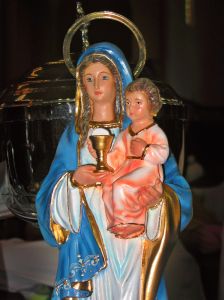The Eternal Promise: Tracing God’s Covenant Through the Ages

In the heart of the Christian faith lies a promise—a promise spoken by God to humanity, a promise of redemption and salvation. This promise finds its culmination in the Feast of the Annunciation, a momentous event that heralds the fulfillment of centuries-old prophecies and divine plans.
The promise originates in the Garden of Eden, where humanity’s first parents, Adam and Eve, fell from grace. Yet, amidst the consequences of their disobedience, God offers a glimmer of hope—a promise to send a Redeemer who would crush the serpent’s head and restore humanity to communion with the divine.
As time unfolds, this promise is passed down through the generations, manifesting in various covenants and divine interventions. From Noah, who was spared from the flood and entered into a covenant with God, to Abraham, who was promised descendants as numerous as the stars and through whom all nations would be blessed.
Through the patriarchs—Abraham, Isaac, and Jacob—the promise continues to be upheld, as God’s chosen people journey through the wilderness, led by Moses, to the land promised to them.
Yet, it is through the prophets that the promise shines forth with renewed clarity and urgency. Isaiah foretells of a virgin who will conceive and bear a son, whose name shall be Immanuel, “God with us” (Isaiah 7:14). Micah prophesies the birthplace of the Messiah in Bethlehem (Micah 5:2).
Through the centuries, God’s promise remains steadfast, weaving its way through the tapestry of human history, guiding and sustaining his people through times of triumph and tribulation.
And then, in the fullness of time, the promise finds its fulfillment in the town of Nazareth, where a young maiden named Mary receives a visitation from the angel Gabriel. In that sacred moment, heaven and earth converge as Gabriel announces the coming of the long-awaited Messiah—the Word made flesh, dwelling among us.
Mary’s response—”Behold, I am the handmaid of the Lord; let it be to me according to your word” (Luke 1:38)—embodies the essence of faith and surrender, as she becomes the vessel through which God’s promise is realized.
The significance of this promise, dear friends, extends far beyond a mere historical event. It speaks to the unchanging nature of God, who remains faithful to his word throughout the ages. It offers hope and consolation to all who journey through the trials of life, reminding us that God’s promises are never in vain.
As we commemorate the Feast of the Annunciation, let us reflect on the depth of God’s love and the power of his faithfulness. Let us open our hearts to receive the promise anew, allowing it to transform us and lead us ever closer to the source of all life and love.






